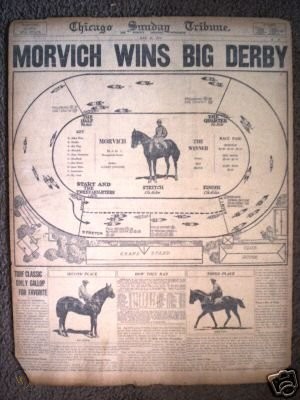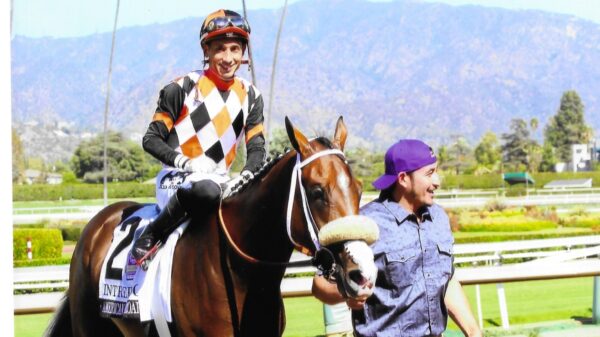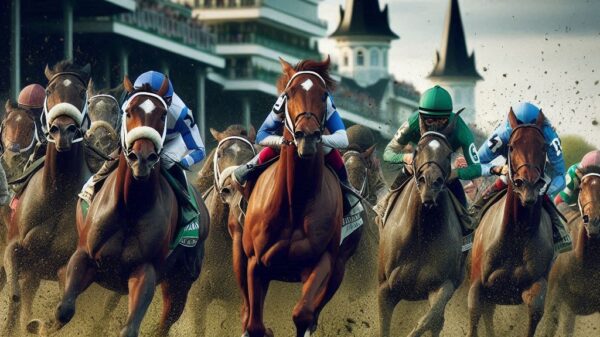By: Rinaldo Del Gallo, III

Rinaldo Del Gallo, III
Justify and Seattle Slew may be the only horses that were undefeated when they won the Triple Crown, but they weren’t the only horses to gointo the Kentucky Derby undefeated. Which brings us to the strange case of Morvich, a horse born in 1919 and the winner of the 1922 Kentucky Derby one hundred years ago.
Morvich was thought to be an “ugly cripple,” trained by Hall of Fame Fred Burlew, the trainer of the Hall of Fame horse Beldame. Burlew’s accomplishments include saving top thoroughbreds during World War I when he was in France.
It is highly unlikely to see anything like Morvich again. While today we have a “Road to the Kentucky Derby,” Morvich actually won the Kentucky Derby in his first start as a three-year-old, something almost literally impossible to do today. Morvich was also the first California-bred racehorse to win the Kentucky Derby, joining the likes of California Chrome (Lucky Pulpit), Decidedly (b. 1962) and Swaps (b.1955). Making it a bit stranger, the Preakness was on the same day as the Kentucky Derby in 1922, even though Sir Barton won the first Triple Crown in 1919. If that is not remarkable enough, it gets stranger yet.
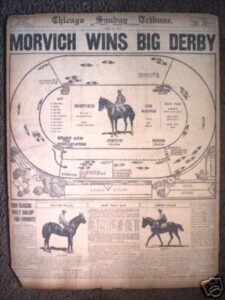 Entering the Kentucky Derby, Morvich raced 11 times and won 11 times, many in some of the most prestigious two-year-old races in the country. Morvich had an incredible year as a 2-year-old in 1921, winning the Suffolk Selling Stakes, Greenfield Selling Stakes, United States Hotel Stakes, Saratoga Special, Hopeful Stakes, Eastern Shore Handicap, Holly Purse, and the Spark Hill Purse. In his last race as a two year old, Morvich won the first running of the Pimlico Futurity, with its rich $50,000 purse, the highest of any two year old race that year.
Entering the Kentucky Derby, Morvich raced 11 times and won 11 times, many in some of the most prestigious two-year-old races in the country. Morvich had an incredible year as a 2-year-old in 1921, winning the Suffolk Selling Stakes, Greenfield Selling Stakes, United States Hotel Stakes, Saratoga Special, Hopeful Stakes, Eastern Shore Handicap, Holly Purse, and the Spark Hill Purse. In his last race as a two year old, Morvich won the first running of the Pimlico Futurity, with its rich $50,000 purse, the highest of any two year old race that year.
In 1922, the year after Morvich won it, the Pimlico Futurity was to be the richest horse race in racing. Morvich actually was one of the greatest two-year-olds of all time. A horse race was named after him that was run in his home state of California at Santa Anita Park, when its name was changed to the Eddie D in 2012.
Despite not running yet as a three-year-old, Morvich was the heavy betting favorite for the 1922 Kentucky Derby. On that same day the Kentucky was run, Pillory was to win the Preakness. Pillory then won the Belmont and was that year’s leading money earner. But in that 1922 Kentucky Derby, Morvich did not disappoint and came home with his expected and customary victory. “My Play” came in 5th, a full brother to Man O’War. My Play was to win the Jockey Gold Cup as Man O’War did himself.
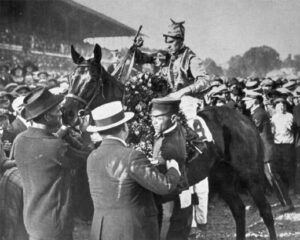
Morvich 1922 Kentucky Derby’s Winners’ Circle
And then the unthinkable happened to Morvich. After Morvich’s 12 race undefeated streak, he never made a trip to the winners’ circle again. In a shocking upset, Morvich came second to Whiskaway in the the third to last running of the prestigious Carlton Stakes at Aqueduct, and the streak was over. Morvich was third in the inaugural running of the Kentucky Special Stakes at Old Latonia Racetrack, there was another second.
The fall from grace was when he ended his career unplaced in the prestigious 1922 Fall Highweight at Aqueduct, won by a champion filly named CAREFUL (USA) br. M, 1918 {23-b}.
While Morvich did sire winners and selling stakes winners at that save for a horse named MORFAIR (USA) ch. H, 1929 {1-j} that won some fairly prestigious stakes races, I don’t know of any famous horse that has his blood. According to American Classic Pedigrees, “He proved a disappointing sire, effectively ending the male line of Hermit in North America.” Hermit was a 7-time leading sire in England and a great influence on the breed. Perhaps Hermit’s last great descendent was FORGIVE N FORGET (GB) ch. G, 1977 {8-j}, a gelded hurtle horse that fell in a race he won, the Cheltenham Gold Cup. Hermit is well entrenched in the pedigree of the thoroughbreds.
Morvich did live on in some pedigrees. My research has found 503 horses that have Morvich and Native Dancer within 6 generations in their pedigree, some born as late as 2013. Morvich was sired by Runnymede, and Runnymede is the famous location of the signing of the Magna Carta. Morvich’s dam Hymir was a male giant that fathered a God–why a female horse would be named after a male figure, I know not.
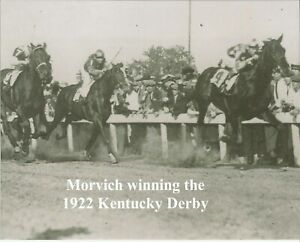
Morvich winning 1922 Kentucky Derby
That said, much less is made of this Morvich horse than the other greatest 2-year-olds of all time, a horse that can rightly be said along with Tremont, Colin, Johannesburg, El Rio Rey, or the Tetrarch. He won 12 races straight, the last being the Kentucky Derby, and few are the horses that can boast 12 consecutive wins when many of those races are in better stakes company. He also came in a dignified second in the reasonably prestigious Carlton Stakes (it was its 3rd to last running) and 3rd in the inaugural running of the Kentucky Special at Latonia Racetrack.
Morvich is wrongly left off the list for “Most wins in one season” by Wikipedia—11 wins in any one year is a lot of wins. Nor does Morvich make Wikipedia’s list for “The horses who were defeated but had ten or more consecutive race wins” though he should be on that list. And while he started off winning minor selling stakes, it culminated in winning some of the major races for two-year-olds.
According to American Classic Pedigrees, Morvich “proved a disappointing sire, effectively ending the male line of Hermit in North America.” Hermit was a 7-time leading sire in England and a great influence on the breed. While Whiskway was not an outstanding sire, he ended up being the dam’s sire to Palestinian, and lives on in the breed through horses such as Sunday Silence. Morvich was the only Kentucky Derby winner from the Hermit sire line, but there are three Preakness winners from this sire line.
And that is the story of Morvich, the horse that won 12 straight horse races in a row culminating in the Kentucky Derby of 1922 one hundred years ago in his first start at three, never to win again.


